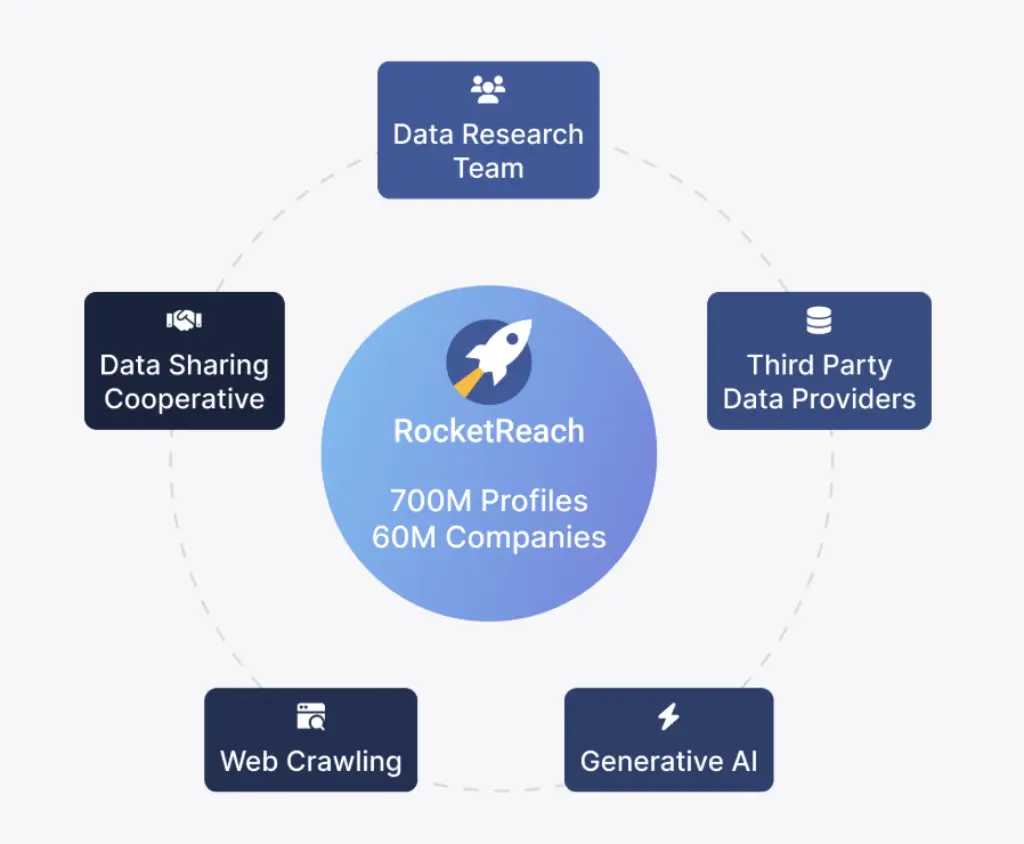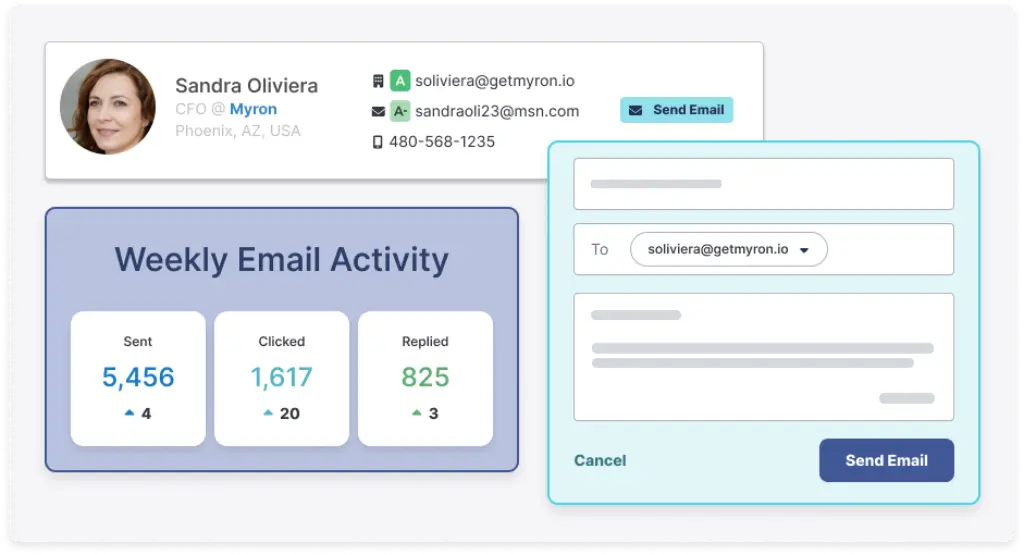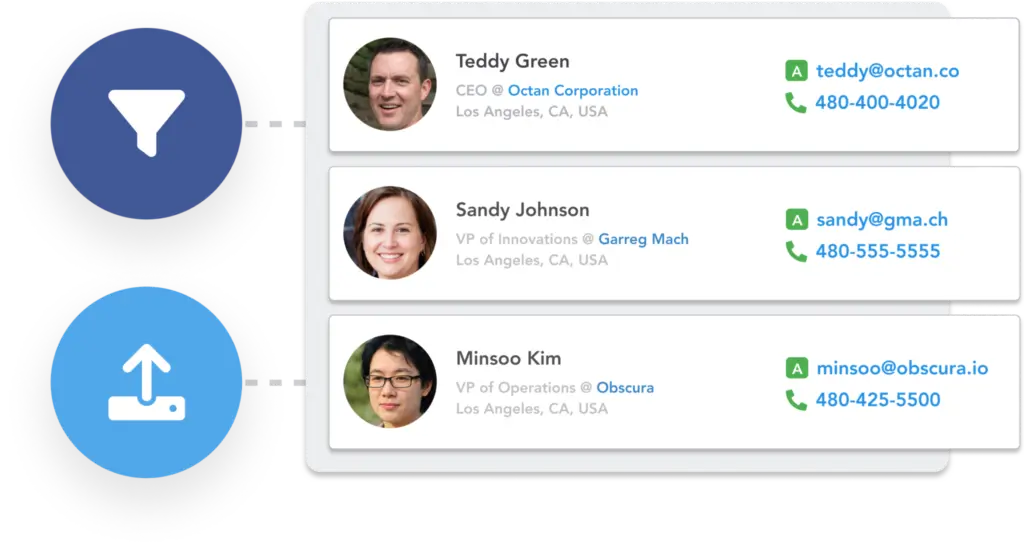Introduction
If you’ve ever spent hours trying to find someone’s email, phone number, or LinkedIn profile, you’re not alone.
RocketReach promises to simplify that process by delivering verified contact data for over 700 million professionals across 35 million companies. Whether you’re in B2B sales, recruitment, or marketing, the idea is simple: find the right contact fast, reach out confidently, and grow your pipeline without guessing.
But is RocketReach truly accurate, easy to use, and worth the cost?
You’re about to find out.
What Is RocketReach?
RocketReach is a B2B data intelligence platform designed to help you find professional contact information quickly and accurately. Whether you need a verified email, phone number, or social profile, RocketReach pulls it together in just a few clicks.
You can use it via a web app or install a Chrome extension to uncover contact details directly from LinkedIn, company websites, or search results.
🔍 Company Background
RocketReach was founded in 2016 by Scott Kim, a former Google engineer. Since then, the platform has grown to serve thousands of professionals across industries, including:
- SaaS and tech startups
- Recruiting and staffing agencies
- Digital marketing firms
- Enterprise B2B sales teams
The company is based in New York, with a global user base tapping into its database of over 700 million profiles.
RocketReach isn’t a full CRM or sales engagement suite – instead, it focuses solely on finding the right people to talk to, so you can plug those contacts into your sales, outreach, or hiring process.
👥 Core Purpose & Target Audience
At its core, RocketReach is built for prospecting at scale.
If you’re a sales rep, recruiter, or marketer trying to expand your outreach pipeline, you know how much time is wasted searching for the right contact info. RocketReach helps solve that by providing:
- Verified email addresses and direct phone numbers
- Company-level data and employee directories
- Real-time search capabilities from LinkedIn or websites
- Seamless export to CRM or outreach tools
Here’s who benefits most:
- Sales development reps (SDRs) need fast enrichment
- Recruiters looking for passive candidates’ verified info
- Growth marketers sourcing leads for cold email campaigns
- Freelancers and agencies managing lead generation for clients
With RocketReach, you don’t need to waste time on bounced emails or digging through outdated lists. The platform aims to make prospecting more precise, scalable, and fast – no matter the size of your team.
In this review, you’ll get a detailed look at how RocketReach works, its pricing, key features, real user feedback, and how it stacks up against tools like Apollo, Lusha, and ZoomInfo.
Key Features
Software Specification
RocketReach stands out for its clean interface, massive contact database, and flexible tools that streamline lead discovery. While it doesn’t try to compete with full CRMs or email automation platforms, it shines in its niche: finding verified contact data fast.
Here’s a breakdown of the platform’s core capabilities
Contact Database & Lookup
This is RocketReach’s bread and butter.
You can search for any person or company and instantly get:
- Verified email addresses
- Direct dial phone numbers (when available)
- Social profiles (LinkedIn, Twitter, etc.)
RocketReach sources data from public sources, then verifies it using proprietary algorithms. According to most user reviews, bounce rates stay below 20%, which is solid for cold outreach.
You’ll also see job titles, company names, and locations to help you qualify leads faster.
Email & Phone Verification
No one wants to burn outreach credits on bad emails.
RocketReach includes built-in email verification and status indicators so you can filter out outdated or risky contacts. Most verified contacts are work emails, with some personal accounts available too (depending on the contact).
Phone numbers are available, but less common – especially for international leads. Still, direct dials show up regularly for U.S.-based professionals.
💡 Tip: Prioritize contacts marked “Highly Deliverable” for best results.
Chrome Extension & LinkedIn Integration
If you’re sourcing directly from LinkedIn, this feature saves time.
The Chrome extension lets you pull data while browsing a contact’s LinkedIn profile or a company page. With one click, you can reveal verified emails, export details to your lists, or sync it to your CRM.
This is especially helpful for recruiters and SDRs who do most of their prospecting on LinkedIn.
✅ Extension also works on company websites and Google search results.
Bulk Lookup & List Builder
Got a long list of leads to verify?
RocketReach supports CSV uploads and bulk lookups, so you can:
- Enrich entire contact lists in minutes
- Build segmented lists by industry, location, or title
- Export results to CSV or CRM
The bulk tool is ideal for campaign prep or cleansing third-party lists before sending your first email.
CRM & Workflow Integrations
RocketReach doesn’t include native automation or email sequencing, but it plays well with others.
You can connect with:
- Salesforce
- HubSpot
- Outreach
- Zapier
- Google Sheets, Gmail, and more
These integrations let you push enriched contact data into your CRM or outreach tools without manual copy-pasting.
API Access & Autopilot Beta
For technical teams, RocketReach offers API access for lead enrichment at scale. This is perfect for developers or data teams building custom pipelines.
There’s also a newer Autopilot feature (in beta) that promises to automate list-building and enrichment using AI filters and intent signals. While still early, it’s something to watch if you’re scaling outreach fast.
Overall, RocketReach gives you the essential tools to find, validate, and export leads – without needing a full sales stack.

Pros and Cons
Benefits of Using RocketReach
Before investing in any lead generation tool, it’s smart to weigh the real-world benefits and limitations. RocketReach is well-known in the sales and recruiting space, but it’s not a one-size-fits-all solution.
Positive
✅ User-Friendly Interface
✅ High Email Deliverability
✅Chrome Extension with LinkedIn Integration
✅ Bulk Lookup & CSV Upload
✅ Integrations with Major CRMs
Negative
❌ No Free Plan
❌ Steep Pricing for Teams
❌ Occasionally Outdated or Incomplete Data
❌ No Built-in Email Sequencing
❌ Support & Billing Complaints
✅ Pros
RocketReach gets a lot right, especially if you need a clean, focused platform to discover and validate professional contact data.
1. User-Friendly Interface
The dashboard is minimal and intuitive. Whether you’re uploading a list, doing a quick search, or using the Chrome extension, everything feels simple and responsive. There’s no steep learning curve.
2. High Email Deliverability
RocketReach focuses on verified business emails, and most users report bounce rates under 20%. This is much better than scraping tools or free extensions.
It also marks emails by confidence level, helping you avoid wasteful sends.
3. Chrome Extension with LinkedIn Integration
One of the best features is the Chrome extension. It works directly on LinkedIn profiles, letting you reveal contact details in real time. You don’t need to copy-paste or switch tabs.
Great for recruiters and SDRs doing daily outreach.
4. Bulk Lookup & CSV Upload
If you have a large list of names or company domains, you can upload it and get results in minutes. It’s perfect for prepping campaign lists or cleansing third-party data.
The system handles bulk jobs fast without crashes or lag.
5. Integrations with Major CRMs
RocketReach connects to platforms like HubSpot, Salesforce, Outreach, and Zapier. You can export contact data directly into your workflows, saving tons of time on manual entry.
❌ Cons
Despite its strengths, RocketReach isn’t without its frustrations.
1. No Free Plan
Unlike some competitors (like Apollo or Hunter), RocketReach doesn’t offer a free tier. You can preview profiles, but unlocking any real contact data requires a paid plan, starting at $53/month.
For casual users, that can be a barrier.
2. Steep Pricing for Teams
Credits run out quickly, especially if you’re doing bulk searches. The Team plans are priced per user, and you’ll need to commit annually to get the best rates.
If you’re scaling outreach fast, the cost can stack up quickly.
3. Occasionally Outdated or Incomplete Data
While accuracy is better than many scraping tools, some contacts are still missing phone numbers or have outdated info. This is more noticeable in niche industries or international markets.
Always double-check confidence scores before sending.
4. No Built-in Email Sequencing
RocketReach doesn’t include email automation, follow-up scheduling, or analytics. You’ll need a separate tool like Mailshake or Reply.io for that.
It’s focused on data acquisition – not campaign execution.
5. Support & Billing Complaints
A common user complaint is slow response from customer support, especially for billing issues or cancellation requests. Some users report difficulty managing subscriptions or getting refunds.
Make sure to manage your account actively if you’re on a paid plan.
⚖️ Final Thoughts on Pros & Cons
RocketReach is excellent at what it does best: helping you find verified contact info quickly and at scale. If you value data accuracy, LinkedIn integration, and a no-fuss interface, it’s a strong choice.
However, if your team needs advanced workflows, campaign automation, or budget flexibility, it may not cover all the bases out of the box.
User Experience
User Interface and Experience
When deciding if RocketReach is the right tool for you, real user feedback offers valuable insights. We analyzed reviews from platforms like G2, Capterra, TrustRadius, and Trustpilot to bring you a clear picture of how RocketReach performs in everyday use.
Here’s what users love – and what they struggle with.
⭐ Overall Ratings Snapshot
| Platform | Rating (Out of 5) | Total Reviews |
| G2 | 4.4 | 300+ |
| Capterra | 4.1 | 100+ |
| TrustRadius | 7.7/10 | 30+ |
| Trustpilot | 2.9 | 40+ |
📝 Note: Ratings vary depending on team size and expectations. Most negative reviews are related to billing or expectations around email success rates.
🟢 What Users Like
1. Contact Accuracy for Business Emails
Many users report strong success with verified work emails, especially for U.S.-based prospects. Email confidence ratings help guide which contacts are safe to use, and bounce rates stay below industry norms.
“Most of the emails I found were accurate and helped me get replies on the first touch.” – G2 reviewer, Mid-Market Sales
2. Seamless LinkedIn Integration
The Chrome extension gets glowing feedback for how well it works with LinkedIn. You can reveal emails on individual profiles, export data to lists, and avoid toggling between tabs.
“This extension makes LinkedIn prospecting 3x faster.” – Capterra reviewer
3. Ease of Use
Reviewers frequently describe RocketReach as clean and simple, without extra features that complicate the workflow. It’s easy to pick up and use within minutes.
🔴 What Users Complain About
1. Outdated or Incomplete Data
Some users report missing phone numbers or outdated job titles. While the email accuracy is generally high, RocketReach doesn’t update contact info as frequently as enterprise-grade tools like ZoomInfo.
“About 20% of the emails bounced, which was higher than I expected.” – Trustpilot reviewer
2. Credit Consumption and Pricing Confusion
A common concern is how credits are consumed per contact. Even previewing full data can use credits in some cases. If you’re not careful, your quota can burn out quickly.
“We ran out of credits too soon and had to upgrade mid-month.” – TrustRadius user
3. Billing and Support Issues
This is where most of the harsh reviews appear – some users felt trapped in auto-renewal or didn’t get timely help when trying to cancel.
“They charged my card even after cancellation. It took weeks to resolve.” – Trustpilot reviewer
Summary: Is the User Experience Solid?
Overall, RocketReach gets high marks for usability and data quality, especially for smaller teams that need email contacts from LinkedIn or company domains.
However, there are a few pain points to watch for:
- Understand the credit system before upgrading
- Preview contact confidence before unlocking
- Monitor billing closely if you’re on a monthly plan

Business Size Fit
RocketReach for Different Business Sizes
If you’re shopping for a CRM, you’ve likely come across big names like HubSpot, Pipedrive, and monday CRM.
RocketReach isn’t a one-size-fits-all tool – but it does cater well to specific business needs depending on your team size and goals.
Here’s a quick breakdown of how it fits solo professionals, small teams, and larger organizations:
👤 For Solo Professionals & Freelancers
If you’re a recruiter, consultant, or freelance marketer handling your own outreach, RocketReach offers:
- Easy-to-use interface with minimal setup
- Quick access to verified emails and social links
- Ideal for LinkedIn-based prospecting via Chrome extension
💡 Best fit: Independent professionals running low-volume, high-precision outreach
👥 For Small to Mid-Sized Teams
Sales and recruiting teams of 2–10 users benefit from shared access and CRM integrations. The Team Pro and Team Ultimate plans offer:
- Admin dashboards and centralised billing
- Shared credit pools for collaboration
- Integration with Salesforce, HubSpot, Zapier, and more
RocketReach becomes especially useful for small teams focused on quality over quantity in their lead pipeline.
🏢 For Large Businesses & Agencies
While RocketReach isn’t a full-scale data warehouse like ZoomInfo, it can support large teams when paired with other tools. It’s often used by:
- Enterprise SDR teams for supplemental contact data
- Agencies managing multiple client outreach lists
- Internal recruiting departments sourcing passive candidates
🚫 Limitations: No email automation, basic reporting, and no advanced segmentation make it less ideal as a standalone solution for enterprise campaigns.
Pricing and Plans
How much does RocketReach cost?
RocketReach uses a credits-based pricing model with monthly and annual plans tailored to individuals and teams. Each time you unlock a contact, you use a credit, so understanding how these credits work is key before choosing your plan.
Individual Plans
These are best if you’re a solo user, freelancer, or running basic prospecting on your own.
| Plan | Monthly Price | Monthly Credits | Best For |
| Essentials | $53 | 80 | Occasional prospecting |
| Pro | $107 | 200 | Weekly outreach, small campaigns |
| Ultimate | $269 | 500 | High-volume lead generation |
👉 Note: Annual billing drops the monthly cost by up to 25%.
Team Plans
For small sales or recruiting teams, RocketReach offers collaborative plans that include shared credits and admin controls.
| Plan | Monthly Price (per user) | Credits per user | Features |
| Team Pro | $83 | 200 | Admin dashboard, CRM integrations |
| Team Ultimate | $207 | 500 | Priority support, bulk tools, API |
🚫 No Free Plan (But You Can Preview)
Unlike some of its competitors, RocketReach doesn’t offer a free plan. You can preview limited contact data, but unlocking it requires a paid subscription.
💡 Tip: Before upgrading, check how many of your ideal leads are covered in the preview.
Billing Terms & Warnings
- No refunds after purchase
- Auto-renewal is standard – cancel at least 24 hours before your next billing cycle
- Support response on billing can be slow (according to some user reviews)
In short, RocketReach’s pricing is not the cheapest, but it may pay for itself if you’re running high-value outreach campaigns that require verified data.
RocketReach vs Alternatives
How Does RocketReach Compare To Other Tools?
RocketReach is a strong prospecting tool – but it’s not the only game in town. If you’re looking for deeper automation, more AI-powered personalization, or better pricing at scale, there are several tools worth considering.
Let’s compare RocketReach with four key alternatives: SmartReach AI, Apollo AI, Prospeo, and Clay.
| Tool | Main Use Case | Best For | Includes Outreach Automation? | AI Features | CRM Integration |
| RocketReach | Verified contact lookup | Sales & recruiters needing clean data | ❌ No | ⚠️ Minimal (Autopilot beta) | ✅ Yes (Salesforce, HubSpot, Zapier) |
| SmartReach AI | Cold email automation | Outreach-focused sales teams | ✅ Yes | ✅ Yes (personalization, inbox rotation) | ✅ Yes |
| Apollo AI | All-in-one sales engagement | Mid-to-large sales teams | ✅ Yes | ✅ Yes (lead scoring, sequences) | ✅ Yes |
| Prospeo | Intent-driven lead discovery | High-ticket B2B prospecting | ❌ No | ✅ Yes (buyer signals, job changes) | ⚠️ Limited |
| Clay | Custom lead workflows | Power users, data ops, agencies | ⚠️ Partial (via Zapier & APIs) | ✅ Yes (AI enrichment + writing) | ✅ Yes |
RocketReach vs SmartReach AI
SmartReach AI is designed specifically for cold email automation and outreach campaigns. While RocketReach focuses on contact discovery, SmartReach takes things further with advanced sequencing, inbox rotation, warm-up tools, and reply detection.
Choose SmartReach if you need:
- Complete cold outreach automation
- Built-in email deliverability tools
- Smart follow-up sequences with personalization
Choose RocketReach if you want:
- Verified contact info at scale
- Better LinkedIn integration
- Clean UI without the learning curve
👉🏼 Read Full SmartReach AI Review Here or visit SmartReach AI platform here
RocketReach vs Apollo AI
Apollo AI is a direct competitor – and arguably the most feature-rich all-in-one platform in this space. It combines lead generation, email automation, deal management, and even predictive scoring.
Choose Apollo if you need:
- A full sales engagement platform
- Large-scale prospecting with enrichment
- Email and call automation, CRM-lite workflows
Choose RocketReach if you want:
- Simpler contact lookup without workflow bloat
- Faster setup and smoother UI
- Reliable enrichment with no fluff
👉🏼 Read Full Apollo.io Review or visit Apollo.io here
RocketReach vs Prospeo
Prospeo is a newer, AI-powered tool that focuses on finding contacts using intent signals and behavioral data. It’s less about bulk and more about context – helping you prioritise leads likely to convert.
Choose Prospeo if you need:
- AI-powered lead prioritisation
- Buyer intent tracking and segmentation
- Signals like recent job changes, company growth
Choose RocketReach if you want:
- Larger database with direct access to contact details
- Faster individual or list-based lookup
- More integrations with standard CRMs
👉🏼 Read our Full Prospeo Review or visit Prospeo directly
RocketReach vs Clay
Clay is best described as a lead generation playground for power users. It’s ultra-flexible, with visual workflows and integrations that let you scrape, enrich, and personalize data using hundreds of sources.
Choose Clay if you need:
- No-code control over enrichment and workflows
- Custom scraping and data manipulation
- AI writing + enrichment inside one interface
Choose RocketReach if you want:
- A more guided, structured contact tool
- Quick start without needing to build custom flows
- More focus on data quality over flexibility
👉🏼 Read our Full Clay Review or visit Clay platform here

Which Tool Should You Choose?
If you’re looking for:
- Accuracy and ease of use: go with RocketReach
- Full outreach automation: consider SmartReach or Apollo
- AI intent data and buying signals: try Prospeo
- Ultimate workflow control and customization: use Clay
💡 For many teams, pairing RocketReach with an outreach tool like SmartReach or Clay delivers the best of both worlds: verified contacts + personalised campaigns.
Conclusion
Final thoughts
If your primary goal is to quickly find accurate, verified contact information – RocketReach delivers.
Its clean interface, LinkedIn extension, and reliable email data make it a go-to tool for:
- Sales development reps (SDRs) who need to build a pipeline fast
- Recruiters searching for hard-to-reach candidates
- Marketers and founders who don’t want to waste time on bounced emails
But RocketReach does come with limits. It’s not an all-in-one outreach solution, lacks advanced automation, and can get expensive if you scale usage or have a large team. Support and billing quirks are also something to be aware of.
🧠 Final Thoughts
RocketReach is best when used for what it does best – finding contact data fast, with solid accuracy, and pushing it into your outreach stack.
If you’re running high-value prospecting with limited time and need clean leads without the bloat of full CRMs or sales suites, RocketReach is a smart choice.
However, if you’re looking for:
- Fully automated campaigns
- Deep personalisation with AI
- Buyer intent signals and engagement scoring
…you might want to pair RocketReach with a more automation-focused tool like SmartReach AI or Clay, or consider an all-in-one option like Apollo.
💡 Bottom line: RocketReach is a solid investment for lean teams who care more about data quality than quantity or automation. It fits perfectly at the top of your lead generation funnel.
Have more questions
Frequently Asked Questions
1. What is RocketReach used for?
RocketReach helps you find verified email addresses, phone numbers, and social profiles of professionals across millions of companies. It’s mainly used for sales prospecting, recruitment, and lead generation.
2. How accurate is RocketReach data?
Email deliverability is typically 80–90% for high-confidence contacts. Bounce rates are lower than most free or scraping-based tools. Phone numbers are less reliable, especially for international contacts.
3. Does RocketReach offer CRM integration?
Yes. RocketReach integrates with tools like Salesforce, HubSpot, Outreach, and Zapier. You can export leads or connect via API for more automated workflows.
4. Is there a free plan or free trial?
RocketReach does not offer a free plan. You can preview contact data, but unlocking any verified contact info requires a paid plan. No free trial is available, but there is limited preview access.
5. Can RocketReach find phone numbers as well as emails?
Yes, but emails are the core strength. Direct dials are available for some U.S.-based professionals, while phone data for international leads is more limited.
6. How does RocketReach pricing work?
RocketReach uses a credit-based pricing model. Each contact you unlock uses one credit. Plans start at $53/month, and team plans offer more credits per user at a higher cost.
7. Is RocketReach GDPR and CCPA compliant?
RocketReach claims compliance with GDPR and CCPA, and provides data removal tools for users. However, it sources data from public records, so always verify compliance for your specific use case.
8. Can I cancel my plan anytime?
Yes, but be careful. RocketReach uses auto-renewal billing, and some users report issues canceling close to renewal dates. Cancel at least 24 hours in advance to avoid extra charges.
9. Is there an API for developers?
Yes. RocketReach provides an API for contact enrichment and bulk processing, which is ideal for developers and data teams needing integration at scale.
10. How can I avoid wasting credits?
Only unlock contacts with “High Deliverability” confidence ratings. Use filters to target specific job titles or industries, and preview profiles before committing credits.







